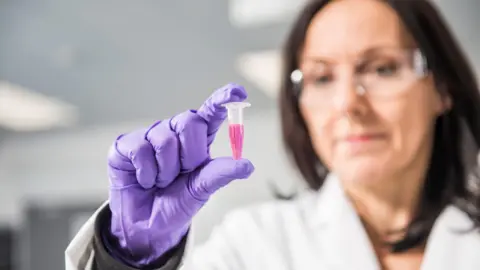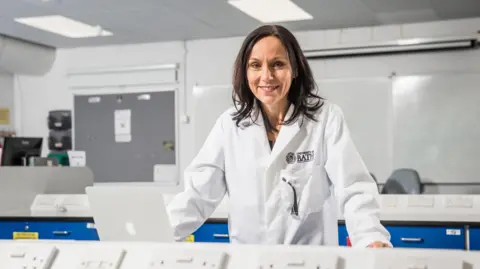UK's first water tracking centre could prevent pandemic
 University of Bath
University of BathThe UK's first pilot wastewater monitoring centre could help avoid future pandemics, a university has said.
The public health surveillance system, based on detecting traces of chemicals and biological markers found in water, has been launched at the University of Bath.
Researchers at the £13m Centre of Excellence Water-Based Early-Warning Systems for Health Protection (CWBE) will track virus and bacterial DNA in wastewater samples, which can act as an early-warning system for outbreaks of infectious diseases.
Weekly samples from four "living labs" in areas of Bath and Bristol, and in rural Paulton and Radstock, Somerset, will be monitored.
Once established in Bath, the team hope the system will be rolled out nationwide.
The data could be used to alert public health teams of new outbreaks and help hospitals prepare for treating patients.
Chemicals excreted by the body will also be tracked through samples, and will indicate everything from chronic disease, stress or inflammation.
Medications or drugs, dietary habits or exposure to pesticides, and personal care products will be tracked from the samples.
 University of Bath
University of BathCWBE lead professor Barbara Kasprzyk-Hordern, from the University's Institute of Sustainability and Climate Change, said: "We saw during the Covid pandemic how useful it was to get data on numbers infected and their location, but it took days to get data back from PCR tests and was very expensive."
It is cheaper and faster to analyse wastewater, which whole communities contribute to than go through clinical screening, she said.
"WBE is comprehensive, anonymous and unbiased and it can pick up asymptomatic cases, those from difficult-to-reach communities or areas lacking testing infrastructure," she added.
Researchers will work with partners at Wessex Water to collect and analyse the weekly samples.
As well as detecting infectious disease outbreaks, the centre also has research projects planned to identify new synthetic drugs being used in communities, and to study the effects of diet and lifestyle choices with chronic health conditions.
Follow BBC Bristol on Facebook, X and Instagram. Send your story ideas to us on email or via WhatsApp on 0800 313 4630.
